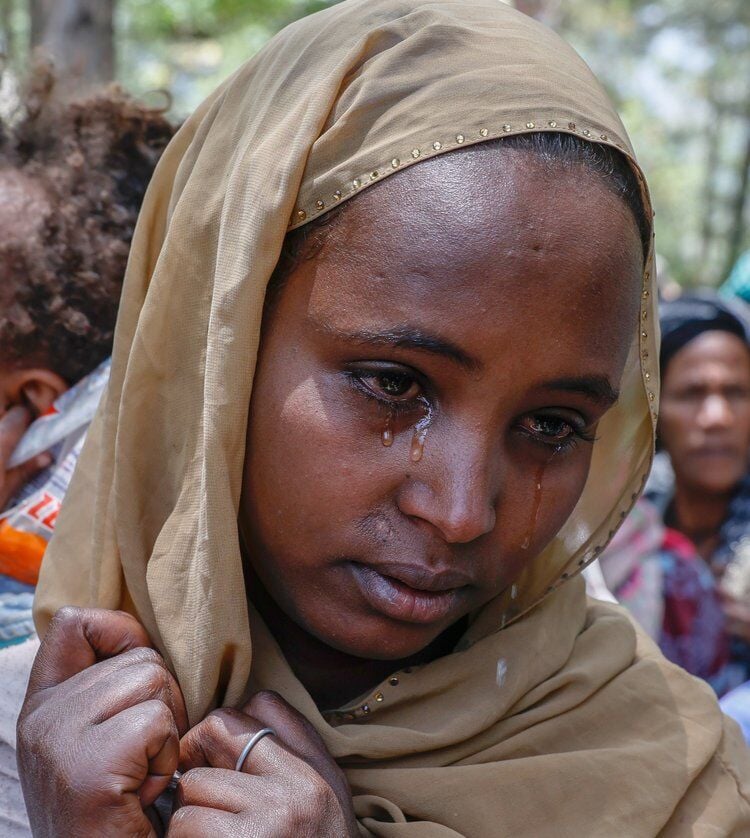
By Truneh Girma
Driven by his hatred and madness Abiy Ahmed is set to eliminate the Amharas from the face of this earth. The Embittered Abiy unleashed his war machine to annihilate people whom he considers unworthy to live along with others. His brutal attack on innocent people is unprecedented in modern Ethiopian history, even under TPLF’s rule. Having extremists, who share his hatred and ethnic purity on his side, he forged forward with total impunity. Abiy’s unchecked malice driven by a toxic ideology of Oromuma has become the architect of suffering everywhere where the Amhara lived. He ordered his henchmen to burn neighborhoods reducing their homes to ashes. Armed with their false narratives they fueled ethnic conflicts. False narratives and misinformation have contributed to the displacement of Amharas from various southern regions where they have lived for centuries. They turned neighbors into enemies and heartless beasts where understanding and unity once thrived.
The world saw the impact of misinformation and dehumanization on eight hundred thousand people in Rwanda; similar issues are occurring in our country. History often repeats in various cycles.
The world is watching this horror without any response which encouraged him even more. His ruthless army destroyed schools, clinics, and crops just to punish Amharas in all levels. The unceasing drone attacks and relentless artillery fires killed the young and the old without discrimination. The innocent people, especially in southern Ethiopia, caught off guard and unarmed could do little to resist; as a result, he was successful to kill hundreds and dislocate millions as they flooded the roads to safety even though safety is an elusive concept anywhere in Ethiopia. It started as ethnic cleansing which soon progressed to full scale genocide. Forcibly displacing Amharas from their land has taken place in Wolega, Arusi Benishangul etc. Causing serious bodily or mental harm, as defined by the United Nations convention is a daily occurrence. He expanded the scope of his genocidal campaign, extended it to the Amhara region.
Deliberately inflicting conditions of life calculated to bring about physical destruction on Southern Ethiopia and Amhara land continues unabated. Imposing economic deprivation to weaken the Amhara people is one of the regimes strategic directions to eradicate the unwanted Amharas.
Thousands of Amharas have been detained due to their identity rather than individual actions. This is simply genocide. Unlawful confiscation of property and bank accounts is an intentional measure to destroy the Amhara people; it is happening daily.
Boiling with unrelenting resentment Abiy relentlessly continued his onslaught on Amhara land. His army and police go around neighborhoods to kill Amharas; to take away everything they owned regardless of value, just to hurt.
But war breeds resistance and that is exactly what happened. Alarmed by his aggression, people armed themselves to defend against the ongoing conflict.
Fano resistance is not just an army, it is the embodiment of hope and survival. Facing against formidable army, armed to the teeth by foreign powers, Fano is fighting to break through this darkness, to ensure the continuity of the Amhara ethnic group. In the end it is not the weapons Abiy amassed to commit every injustice that counts, it is the courage of those who stood against him, the resilience of those who refused to surrender. Perseverance eventually overcomes a reign of terror. They stand firm, not it is easy but because theirs and their ancestors’ spirits are unyielding. As they say, ‘their courage is not an absence of fear, but the will to move forward despite it.”
Let it be clear to all friends and foes alike that their defiance inspires other Ethiopians; even those who watch from the sideline until the dust clears. Those who stand on the sideline, including the international community, in the face of genocide must ask themselves: will they simply be witnesses or will they stand with the victims? We know Abiy’s survival relies on constant conflict. Abiy and his henchmen, armed with Oromuma ideology, instigate war everywhere disregarding suffering and destruction. Instead, they plant trees to protect the dead from the elements.
Silence encourages Abiy and his Oromuma group and prolong injustice, which, unchecked, will reach other Ethiopians.
The genocide on Amhara is a genocide on all Ethiopians, which is why everyone has a role to play beyond admiring the resilience of Fano from a safe distance. Abiy is killing and forcibly displacing Amhara, but he ithe enemy of all Ethiopians. His group thrive in conflict destabilizing regions whether direct or proxy battles, like Somali and Afar. His eventual downfall is a given; history bears witness that such barbaric actions and hatred inevitably end. The question is: where do Ethiopians of all levels of society stand? how about the silent international community?
We know undoubtedly that with unshakable moral strength and a just cause, the Amhara people will forge ahead, carving their history with unwavering resolve and, if necessary, their own sacrifice. Through resilience and courage, they will shape a future defined by dignity, perseverance, and the pursuit of justice.
History will remember both the oppressed, the Amhara people, and the oppressors, Oromuma, but only one side stands on the path of justice. The question is not just where you will stand, but what legacy you will leave behind. Will you stand with the victims, the Amharas, who endured yet rose with dignity, or with the tormentors whose actions time will condemn? In the end, history judges not by words, but by deeds. Remember: justice lies in upholding what is right despite the forces that seek to diminish it. Standing shoulder to shoulder for truth and justice is how we push back against evil, against darkness. The boundless hate of Oromuma against the Amharas require both individual and collective response.
Would you join the struggle for survival and justice?
If not now, when?
.
.
.
#descent #darkness #Amhara #Annanhilation #Habesha #Latest #Ethiopian #News #Insightful #Annihulation
Source link











